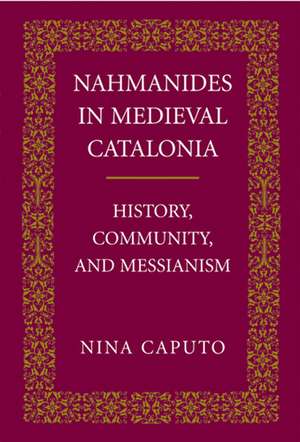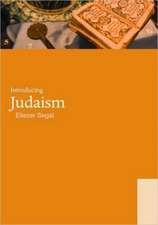Nahmanides in Medieval Catalonia – History, Community, and Messianism
Autor Nina Caputoen Limba Engleză Paperback – 14 ian 2008
In this detailed study, Nina Caputo examines conceptions of history and messianic redemption in the writings of the Catalonian rabbi and brilliant Talmudic scholar Nahmanides (1195–1270). An early exponent of kabbalah, Nahmanides was also a shrewd intermediary between the Jewish communities and the royal administration of Aragon. Most intellectual histories focus on Nahmanides in the fairly insular context of Jewish community dynamics, but this volume explores the largely unexamined history of encounters between Jewish and Christian interpretations of history and redemption, as well as the significant role played by Jews in the expansion of the Crown of Aragon during the thirteenth century. Caputo explains Nahmanides' distinctive understanding of the shape and meaning of historical time and change and reveals how his discourse frequently confronted Christian views of history and scripture, sometimes embracing Christians forms, but at other times directly refuting them.
Nina Caputo's book is the first to situate Nahmanides in the full intellectual and religious context of thirteenth-century Catalonia. It makes an important contribution to the fields of Jewish studies as well as medieval and early modern history.
“Nahmanides in Medieval Catalonia is a compelling illustration of meticulous scholarly attention, of subtle historical consciousness, rigorous rhetorical and literary sensibility, and true, wide-ranging synthetic ability—it uniquely draws from the entire corpus of Nahmanides' work in order to reframe conflicts and disputes, once again, as fertile and positive exchanges.” —Gil Anidjar, Columbia University
“Caputo has written a brilliant monograph on one of the most fascinating minds of the High Middle Ages. By aligning the intellectual and communal activities of Nahmanides within the context of both Jewish and medieval Spanish vernacular texts she brings academic rigor and interdisciplinary scholarship to throw new light on both communities at a critical moment in their development. Each chapter reveals the subtle ways that Nahmanides constructed intellectual and social frameworks for Jews to preserve their unique identity while sharing cultural and aesthetic norms of the Christian society that surrounded them.” —Michael A. Signer, Abrams Professor of Jewish Thought and Culture, University of Notre Dame
“This book offers a meticulous and thoughtful reading of the themes of history, prophecy, and progress in Nahmanides' exegetical, theological, and polemical works. It joins a growing body of scholarship that emphasizes the extent to which even tense and hostile Jewish-Christian confrontations were predicated upon shared cultural and intellectual approaches. It is sure to interest and engage scholars in the fields of Judaic studies, Iberian history, and biblical studies.” —Sara Lipton, Stony Brook University
Preț: 265.92 lei
Nou
Puncte Express: 399
Preț estimativ în valută:
50.89€ • 52.93$ • 42.01£
50.89€ • 52.93$ • 42.01£
Carte tipărită la comandă
Livrare economică 15-29 aprilie
Preluare comenzi: 021 569.72.76
Specificații
ISBN-13: 9780268022938
ISBN-10: 0268022933
Pagini: 328
Dimensiuni: 152 x 229 x 19 mm
Greutate: 0.48 kg
Ediția:1
Editura: MR – University of Notre Dame Press
ISBN-10: 0268022933
Pagini: 328
Dimensiuni: 152 x 229 x 19 mm
Greutate: 0.48 kg
Ediția:1
Editura: MR – University of Notre Dame Press
Recenzii
“. . . A refreshing study that attempts to demonstrate that Nahmanides’ engagement with Christianity and Catalonian culture provided the main framework of his writings. As such, Caputo’s research is valuable and offers a new and broad perspective for understanding the significance of this engagement to Nahmanides’ biblical commentaries and to the literary character of his writings.” —Journal of the Association for Jewish Studies
“This book explores Nahmanides’ uses of history and his interaction with Iberian Christian culture in a number of related contexts: his stance during the controversy over the works of Maimonides, his typological understanding of the Creation story and the patriarchal narratives in Genesis, his role in the Barcelona disputation, and his messianic expectations and calculations..” —Speculum
“[T]he book offers fresh perspectives on several central components of Nahmanides’ literary output. In addition, anyone looking for a primer on the major scholarly issues surrounding Nahmanides and his period will find a treasure trove in the erudite endnotes. They . . . contain a wealth of information on many aspects of Nahmanides’ thought and medieval Jewish intellectual history.” —Journal of Religion
Notă biografică
Nina Caputo is assistant professor of history at the University of Florida. She has published a number of articles and reviews on medieval and Jewish history.













